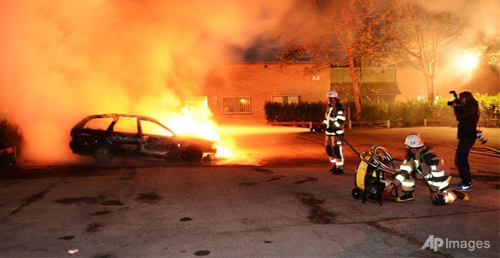The riots in Sweden

The opposition leader, social democrat Stefan Löfven, on the other hand, visited Husby without media knowing it very early on because he wanted to "find out directly from the people involved what was behind it all."
The difference on the political level is striking. On a "lower" and very hands-on level, fireman Mattias Lassén wrote an open letter on Facebook to the kid that had been throwing stones at the fire brigade saying that he simply couldn't grasp this behaviour. He wrote that he'd be more than willing to put his own life on the line to help the stone-thrower's sister if a fire started in her kitchen, if his father had a car accident, or if the stone-thrower himself went through the ice on some warm March day (he wrote several more examples to the same effect), and subsequently he didn't understand why he suddenly was to become the target of the big rock that was hauled through the windshield of the fire truck and hit his helmet.
In a subsequent interview, Mattias Lassén explained his view further and said that we all have to remember that each of the individuals involved in this, on either side, are just individuals with talents and links to each other in other capacities. We should never let othering happen, since this would make it even more difficult to find a functional solution.
The general public in Sweden seems torn. There are some voices calling for a strong police force to "take care of those vandals" and punish the parents of the rioters. Other people feel that it's the police that are the bad guys when using too much force and that society/those in power are to blame. Thirdly, there seems to be a view arguing that the riots are an overreaction and a heavy hand from the police would be as well. People with this view often see the origins of these clashes in the politics of the current right-wing government or in the outsider status of these youngsters (since they have had virtually zero chances of getting a job or becoming integrated in Swedish society), but they also stress that riots, setting fire to cars etc are unacceptable as tools to achieve integration. Professor Ulf Bjereld, for instance, argues that a historical overview, less moralisation, and a less romantic view on violence are needed, and, in addition, he urges the state to step up and take responsibility.
It has been discovered that many of the youngsters that have been arrested in the last few days already have a criminal record. This complicates the image further, but it also underlines the limited chances these kids have had and the need to politically deal with issues of integration in a manner that is inclusive rather than exclusive.
It would be possible to draw parallels between what is happening in Stockholm and in other places in Sweden today and what happened in France in 2005 and in Belfast earlier this year. It doesn't necessarily have anything at all to do with immigration, just about being vulnerable and feeling that nobody listens. It might become a huge problem when this vulnerability and despair is used by groups with other agendas, be it political or criminal. In my opinion, this is the major danger in situations such as these.
Image borrowed from Channel News Asia.
Kommentarer
Trackback

